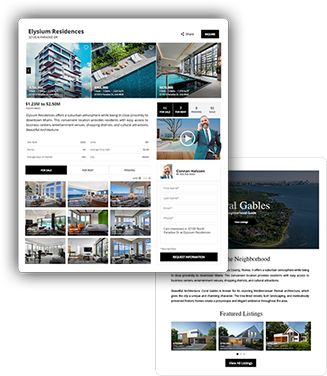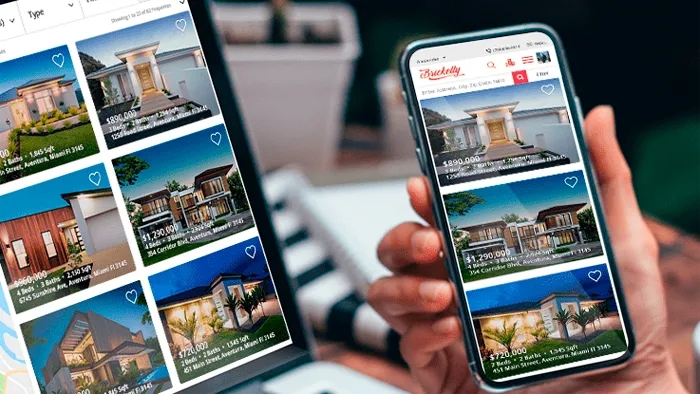Do real estate agents need a website?
So, you’re trying to find the best features for your real estate website? But you are unsure if real estate agents need a website.
Sit tight, because by the end of this article you will be able to answer that question for yourself.
In 2020, the world has gone completely digital.
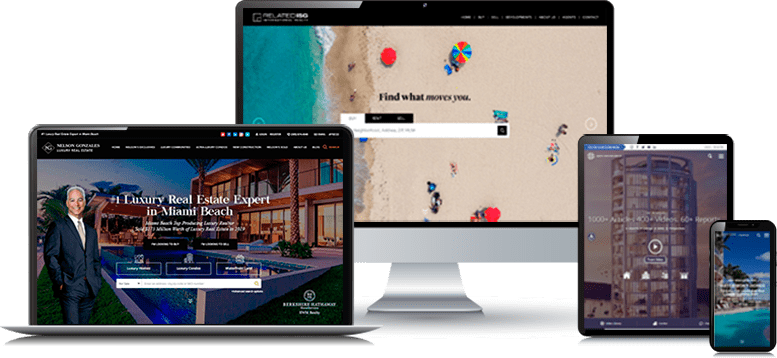
Whether you deal with online leads or referrals from your personal network, the old way of doing business is becoming a distant memory with each passing day.
Between social distancing, virtual home tours, Zoom meetings, and the “new” normal; home buyers & sellers are now online, more than ever.
What does this mean for you and your business?
Evolve or get left behind!.
‘It is not the strongest of the species that survives, not the most intelligent that survives. It is the one that is most adaptable to change‘. – Charles Darwin
Can I Use a Basic Website for My Real Estate Business?
Your website is the modern day business card. Without it, potential new clients are less likely to trust your company. Especially, if you are contacting them using a gmail, hotmail, or any of those generic email platforms.
In this day and age, consumers want transparency. They want to know who they are doing business with. This means having a website (even a basic one) has become the basic standard of doing business.
Now, as a real estate agent, what separates a basic website from a great website?
A basic website can be a simple landing page with your name, contact information, and a few words about yourself and your company. This most likely won’t generate you a whole lot of new business, but at least you will have some type of online presence.
Now you have to ask yourself, do you want your website to be another business expense? Or do you want it to be a resource that helps you grow your business?
Even basic websites will incur a cost. You’ll have to purchase the following: domain name, hosting, website design/development, and much more depending on what you are trying to do.
If you create a website that is a tool or resource for your clients, assisting them throughout their home buying (or selling) journey, your website will become an investment instead of an expense. Allowing you to open a whole new book of business you never dreamt possible.
What features does your real estate website need, to be the BEST?
Now we get to the good stuff, the features that make the BEST websites for REALTORS. We’ve broken it down into 11 different features, but they should all be working together in unison. Some of these features you might have read or heard about in other articles, but if they are not integrated properly then it is all meaningless.

Website Features (short version):
- Responsive Website
- Desktop vs Mobile
- Custom Search
- Narrow down your search to easily find the type of property you are looking for.
- Interactive Map Search (50/50 Page)
- Nowadays the only websites with this capability are the multibillion dollar ones like Zillow, Realtor.com, Trulia, Redfin, etc.
- There are very few (if any) IDX providers that have these capabilities.
- Custom Content (Speak directly to your user)
- In a world where everything is generic, it is important to differentiate yourself from the rest. Being able to put a custom video on each landing page, that provides users with quality information that is not found anywhere else on the internet; will make you stand out.
- If you do not have a video, you have the option of adding an image (but these have a tendency to convert less).
- Lead Capture Forms
- How are you building your customer list? Are user’s providing you with their information after they land on your website? Do they just visit your website, take your information and leave?
- Make sure you are capturing your web visitor’s information. The real estate process takes many touchpoints before user’s begin to trust you.
- Personalized Experience
- Each person that visits your website has a different need. Does your website provide each user with a unique experience? Is that experience relevant to their wants/needs?
- Custom Email Alerts
- With real estate being a high ticket item, your end user isn’t going to be providing their credit card information on your website. We’re still some time away from purchasing homes online. The home buying process takes time, how are you bringing the user back to your website? The goal is to have them keep searching for properties on YOUR website.
- Easy to Navigate
- Is it easy for your users to get to where they need to on your website?
- With a well built navigation your user will be able to find what they need from any page on your website.
- Leads Flow into a CRM Database
- Are you easily able to keep track of all of your leads in one centralized database?
- Follow up every interaction with each lead, individually.
- The ability to pass this lead on to another team member (if needed).
- See what properties your website visitors are looking at.
- Are you able to see what properties your user is looking for? Which properties are their favorites? What areas are they saving?
- This information is vital when it comes to providing your client with the best properties that match what they want.
- Ability to create landing pages in minutes
- When we first started it would take us months to build a website. Now with the proper technology, you can create custom landing pages that compete with Zillow’s in a matter of minutes.
- Create as many areas as you need, seamlessly.
The 11 features that will make your real estate website the BEST!
1. Desktop View vs. Mobile View
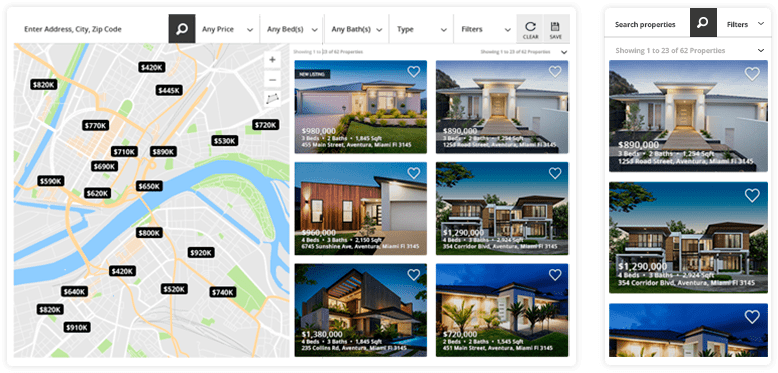
What does it mean to have a responsive website? It means that your website will fit on any device’s screen, no matter the dimensions.
We recommend taking it one step further, provide a separate user experience for desktop than for mobile.
This provides each user an optimal experience, no matter which device they’re on when they visit your website.
2. Custom Search Filters
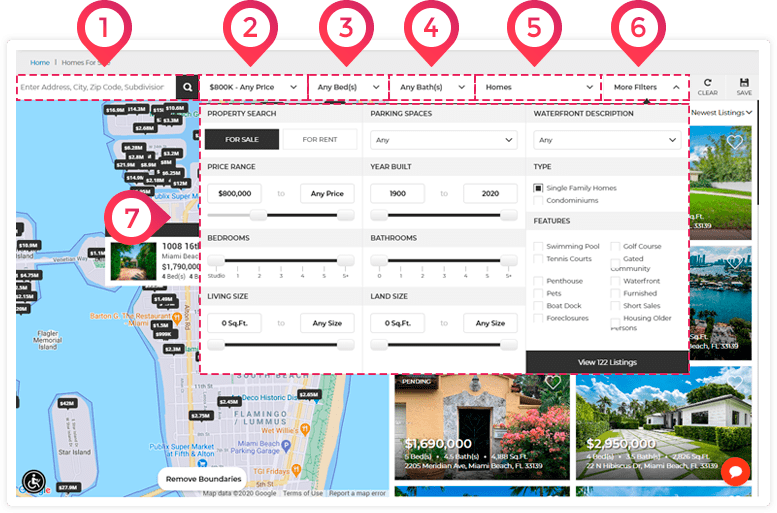
If there are over 10K, 20K, 50K homes for sale in your area it would be daunting to search through all those properties. With custom search filters, we are able narrow down the results and find the properties that meet your client’s needs. No reason to sift through 50,000+ listings.
You should be able to filter your home search using a any combination of the following options:
- By location
- With this filter you are able to narrow your search by city, neighborhood, address, MLS#. The user basically has a connection to the MLS database through your real estate website.
- By price
- Narrowing your search by a specific price range.
- By number of bedrooms
- By number of bathrooms
- Property Types
- House
- Condo/Apartment
- Townhome
- More Filters – Narrow down by
- for sale vs for rent
- Living Size
- Land Size
- Parking Spaces
- Year Built
- Waterfront Description
We have more options, but these are the top filters used in a custom home search.
3. Interactive Map Search (50/50 Pages)

This is the best feature to have on real estate websites. The few websites that provide this type of user interface are the giants: Zillow, Trulia, Redfin, etc.
You will need to contact an IDX provider to connect your website to the MLS. The issue with a lot of these providers is, the majority of them showcase properties in list format, which is not an optimal experience when searching for a home.
Companies, like Zillow, have spent hundreds of millions (if not billions) of dollars in research & development. Over their years of research and through our own personal experience, we have found this to be the best method when searching for homes online.
4. Ability to add Custom Content (Video or Image w/CTA)
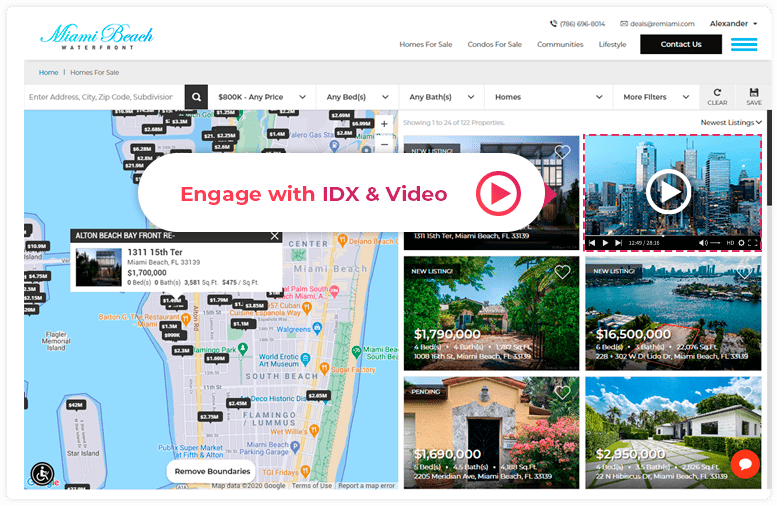
If all the top real estate websites have a similar look and feel, how are you able to differentiate yourself from your competitors?
High quality, custom content!
Zillow is a 1 size fits all product. They are everything to everyone. Making them a cookie cutter option. Home buyers are looking for someone to guide them, not just give them a walk-through of a property.
When it comes to the local area you service, these platforms can’t compete. They do not have your market knowledge and neighborhood expertise.
When you provide your website visitors with information not available or easily accessible to them, you gain their trust. You will be viewed as the real estate authority in your area.
5. Lead Capture Forms
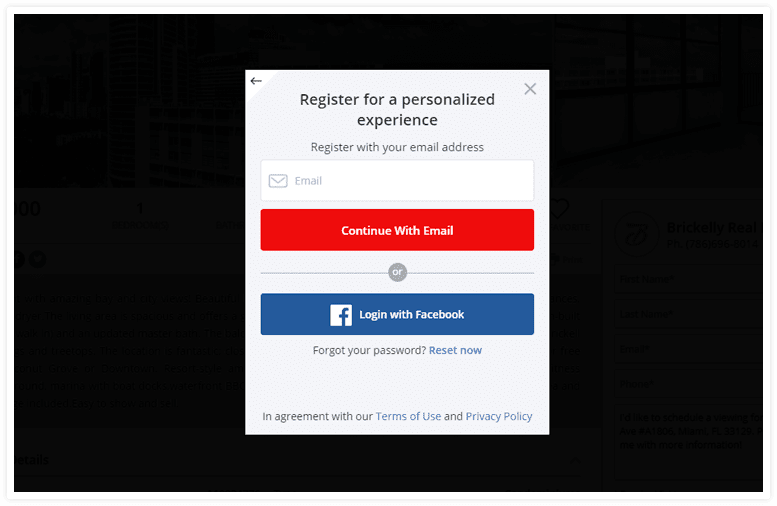
Your website is worthless, if it doesn’t generate you new business.
The lead capture form is a crucial component to turn your website’s traffic into high-quality real estate leads .
We categorize website leads into 2 types: (1) Cold Leads or (2)Hot Leads.
Cold real estate leads, refers to a person that provided their name/email/phone#, but does not wish to be contacted.
Hot real estate leads, the user provides their information and wants be contacted Immediately. Examples of hot leads are users inquiring about a specific listing, building, community or they filled out your contact page.
Cold leads are potential home buyers (or sellers) interested in the areas you focus on. The only difference is the user provided their information in exchange for a non-monetary “value offer”.
Examples of non-monetary “value offers” are:
- E-books (ex: Download – 10 things every home buyer needs to know) ‘
- Quarterly Market Reports (ex: Download Our Latest Market Report)
- View properties on your website. (ex: To keep looking at property information, please register on our website).
- Weekly Newsletters (ex: Register for Our Newsletter)
Cold leads filled out a form on the website with the purpose of: Downloading one of our “value offers” OR register/sign up on the website to create a profile.
**Cold leads are a soft sale. REMEMBER, real estate is a process of many touch points between you and your leads, with the goal of eventually converting them into (paying) clients.
Cold leads are important because we are able to generate a higher quantity of leads that we can keep bringing back to the website till they become hot leads
6. Personalized User Experience
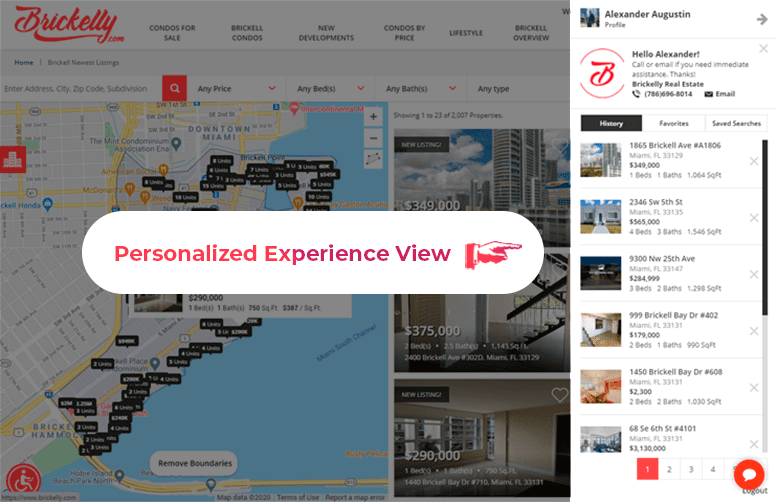
The future of real estate, is providing each individual with a personalized home buying (or selling) experience .
The same goes for your website. Your website should be able to provide each user with an experience that matches their needs/wants.
Just like Google does it. Google customizes each search result per individual based on their history and personal data.
Provide users with the tools they need when searching for a home.
Allow website visitors to save their favorite properties, track properties they previously viewed, save custom search filters, and personalize their home search.
7. Email Property Alerts
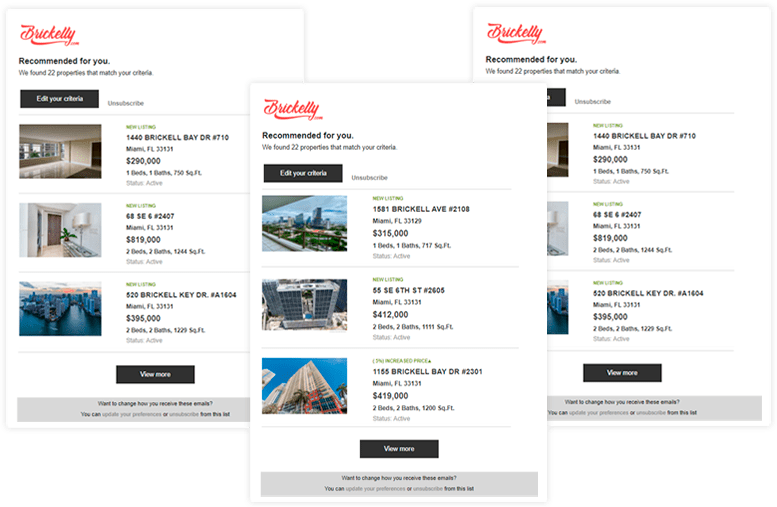
Once you’ve captured a user’s information on your website (see previous feature), what are you supposed to do with it?
The answer is, provide your leads with valuable market information, custom branded content and personalized assistance.
Email property alerts, are able to provide your real estate leads with all of the above.
The automated property alerts appear with your logo, headshot and personal contact information.
The property alerts, email your leads, newest listings to hit the market (similar to properties that match their previous search criteria) or listings with recent price reductions (of properties they had viewed, favorited or with similar parameters).
Email alerts can be set up to be sent daily, weekly or monthly.
This is the top feature to keep cold leads returning to your website to keep searching for homes, until they become a hot lead.
8. Easy to Navigate
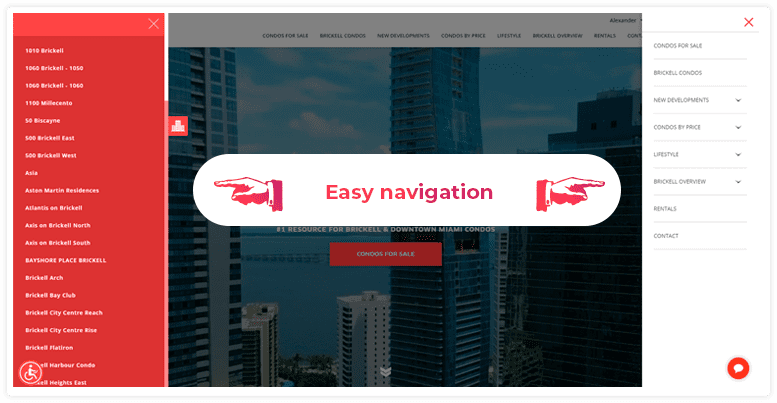
This is a simple feature, but a key part of providing your website visitors with an immaculate user experience.
The importance of an easy to navigate website is to find your way around the website, no matter what page you’re currently on.
Providing custom menu navigations, that are easily accessible, allows the user to jump around between pages without ever getting lost on the website.
It doesn’t matter what page the user is on, they’ll be able to get to where they need to go on your site, in less than 2 clicks of the mouse.
9. CRM – Customer Relationship Management Tool
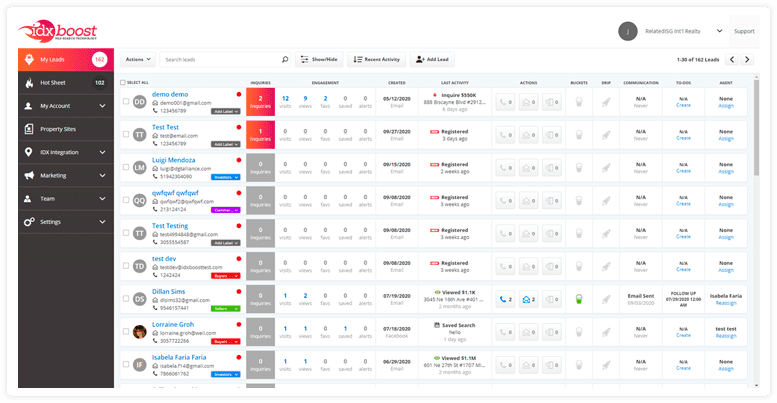
CRM software for real estate professionals acts as a centralized database for lead, prospect and client information. With the CRM you are able to build relationships and make data-driven decisions.
For top producing real estate agents, a CRM is a vital tool for managing a healthy pipeline of leads. The CRM should save you time, reduce stress and track all the important stuff. Here are some of the key features a CRM offers to make your life easier:
- Organize lead information, easy to navigate and find information (i.e., no more hunting through spreadsheets).
- Quickly respond to property inquiries without having to dig through your inbox.
- Keeping track of which prospects you’ve reached out to and which ones are farther along in the home buying process.
- Gather information digitally, such as your prospects’ website activity or whether they opened your emails.
- Manage your sales pipeline in one place and keep track of closings.
- Maintain contact with past clients for relationship management and future referrals.
- Automate tasks and workflow, such as, email follow-ups
10. See the listings your website visitor is viewing
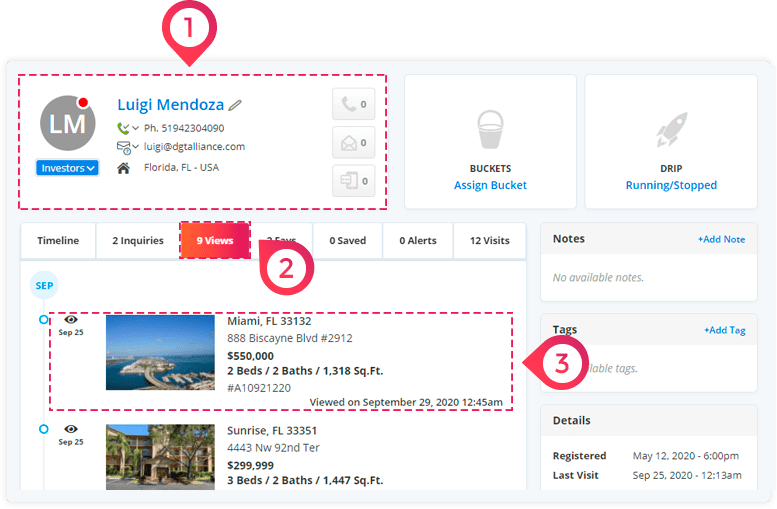
- Lead’s personal information
- Filter the properties your lead has viewed
- Most recent listing viewed
Each website interaction is tracked and provides a date/time stamp. This helps when assisting your leads in their home buying process.
In the past (pre-Google, pre-Zillow), you would have to interview each home-buyer. Next, search the MLS for properties that match those specifications. Then send them properties directly from the MLS (which has the interface of an outdated system).
The issue is a user’s wants/needs don’t always match the current inventory of homes available. If the user is able to see what is currently available in the market, they won’t prolong the search process in hopes of finding a “better” home.
11. Create custom landing pages in minutes
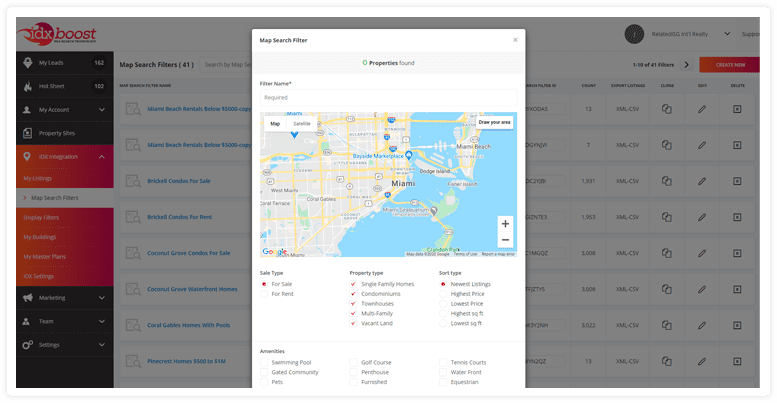
If you’ve ever built a landing page before, you know it can be time consuming.
Even with software’s like Constant Contact, Wix, Unbounce, Lead Pages, etc.; who attempt to streamline the process, still need a lot of time put into them to get any type of results.
Your time should be utilized by speaking to leads, showing properties and closing contracts. Not building a landing page that takes days (or even weeks) to finish.
The worst part about these platforms, is they don’t provide data from the MLS. Unless you add each property’s information one at a time, you will not be able to show up-to-date information on what homes are available in the area.
Your real estate website should have the ability to create custom landing pages with the property information from the MLS. This information is updated by the hour and it would be nearly impossible to manage it manually.
Whether the user is searching for a specific city, neighborhood, community, building or other types of geo-targeted areas; you should have the ability to create a page for each one of these search filters.
If the user want to search by zip code, or homes near specific schools, or homes in the top gated communities, or all the units in a specific condo building; you should have the ability to provide a page for each type of search.
This feature should be available on any platform that promotes they create the best websites for real estate brokers and agents. AND it should allow you to create each of these landing pages in under 5 minutes.
Conclusion
What do the BEST websites for Real Estate Professionals provide?
In my professional opinion it’s binary.
Your website either makes you money or costs you money.
The 11 features a real estate website should have were hand picked from websites of real estate agents, teams and brokerages in the U.S that were able to make tangible return on their initial investment.
Not only were they able to make an R.O.I. , but once the infrastructure was built the results grew exponentially for each person that provided these features on their websites.
In the end the websites have become a powerful tool for the growth and development of their businesses. They have become assets for their companies (as opposed to expenses).
Finally, the best features were created with the end user in mind. Providing home buyers (and sellers) with an incredible & seamless real estate experience, from their first online search to purchasing their dream home.
Making the owner’s of these real estate websites very happy (and profitable) business owners.
Stop Losing Deals Get a Website That Works for You
Your website should be your strongest asset, not your weakest link. Let’s build a high-performing site that turns visitors into clients.
Get a powerful website today